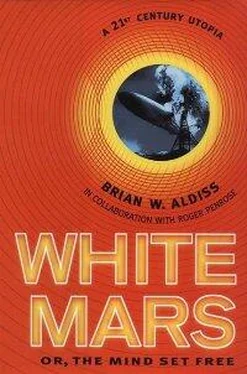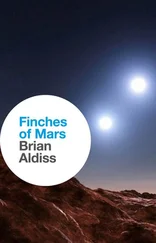Brian Aldiss - White Mars
Здесь есть возможность читать онлайн «Brian Aldiss - White Mars» весь текст электронной книги совершенно бесплатно (целиком полную версию без сокращений). В некоторых случаях можно слушать аудио, скачать через торрент в формате fb2 и присутствует краткое содержание. Год выпуска: 1999, ISBN: 1999, Издательство: Little, Brown UK, Жанр: Фантастика и фэнтези, на английском языке. Описание произведения, (предисловие) а так же отзывы посетителей доступны на портале библиотеки ЛибКат.
- Название:White Mars
- Автор:
- Издательство:Little, Brown UK
- Жанр:
- Год:1999
- ISBN:0-316-85243-0
- Рейтинг книги:5 / 5. Голосов: 1
-
Избранное:Добавить в избранное
- Отзывы:
-
Ваша оценка:
- 100
- 1
- 2
- 3
- 4
- 5
White Mars: краткое содержание, описание и аннотация
Предлагаем к чтению аннотацию, описание, краткое содержание или предисловие (зависит от того, что написал сам автор книги «White Mars»). Если вы не нашли необходимую информацию о книге — напишите в комментариях, мы постараемся отыскать её.
White Mars — читать онлайн бесплатно полную книгу (весь текст) целиком
Ниже представлен текст книги, разбитый по страницам. Система сохранения места последней прочитанной страницы, позволяет с удобством читать онлайн бесплатно книгу «White Mars», без необходимости каждый раз заново искать на чём Вы остановились. Поставьте закладку, и сможете в любой момент перейти на страницу, на которой закончили чтение.
Интервал:
Закладка:
A cabal of senior executives was involved. Five arrests were immediately made, although all managed mysteriously to escape custody and were not recaptured.
Investigators visiting a vice-chairman’s residence on Niihau Island, in the Hawaiian chain, were met by gunfire. A two-day battle ensued. In the bombed-out ruin of the palace were found disks incriminating directors of the consortium: tax evasion on a massive scale, bribing of lawyers, intimidation of staff and, in one instance, a case of murder. The affairs of EUPACUS were put on hold.
EUPACUS offices were closed, sealed off for judicial investigation. All flights were halted, all ships grounded. Mars was effectively cut off. Suddenly the distance between the two planets seemed enormous.
Our feelings were mixed. Along with alarm went a sort of pleasure that we had been severed from the contemptible affairs of Earth for a while.
We did not understand at first how long that while was to be. Earth’s finances were entangled with the vast EUPACUS enterprise. One by one, banks and then whole economies went bust.
Japan’s Minister of Exterior Finance, Kasada Kasole, committed suicide. Four hundred billion yen of bad debts were revealed, hidden outside the complex framework of EUPACUS accounts. The debts stemmed from tobashi trading; that is, moving a client’s losses to other companies so that they do not have to be reported. Chiefly involved was the Korean banking system, which had invested heavily in its own right in EUPACUS.
An equities analyst said that the Korean won, closely linked to the Japanese economic system, was now standing against the US dollar at “about a million and falling”.
Recession set in, from which the EU was particularly slow to recover, as its individual members were forced, one by one, to close shop.
All round the globe were companies and manufactories that had relied on or invested in EUPACUS business. Many were already in debt because of delayed payments. The closure of EUPACUS Securities led to a collapse of the world banking system.
Shares fell to just over one quarter of their 2047 peak. Property values followed, leaving the PABS—Pacrim Accountancy and Banking System—with substantial bad debts and asset write-offs. The IFF was unable to muster a credible rescue package.
The deflationary impact was already being felt in North America. The situation, said one US official, was deteriorating dramatically as Asian speculators were selling off their huge holdings of US financial assets in order to try and meet their obligations nearer home. “The US home market is going into meltdown,” an official said.
Only a month after this remark, the world’s economy was in meltdown.
We sat on our remote planet and watched these proceedings with a horrified fascination. Bad went to worse, and worse to worse again. There came the day when terrestrial television went dead. And we were truly alone.
A fish stinks from the head. I’m told it’s an old Turkish proverb. Despite the rigorous checks that had been set up by the UN, bad conditions and poor pay had made workers in the Marvelos Health Registration Department just as open to bribery as those at the top of the vast organisation.
So it was that Antonia Jefferies and her husband Tom were able to pass the Gen S Health Test and travel to Mars on a CRT trip just under four years before EUPACUS collapsed, and the world economy with it.
Antonia suffered from a cancer of the pancreas, on which she had refused to have nanosurgery; it was a long while before I discovered why. Nevertheless, the gallant woman was determined to set foot on the Red Planet before she became too ill to travel. Her interest was in the Smudge experiment, which she saw as an extreme example of the interlinkage between science and human life, for good or bad.
She was a historian. Her boovideo, The Kepler Effect, had been a bestseller. Tom Jefferies had moved from employment as a theoretical physicist specialising in monopole research to what he called Practical Philosophy. His new profession brought him fame and the soubriquet the “Rich Man’s Tom Paine”.
Tom was in his early fifties. His wife was forty-eight. They had no children. He had married Antonia only after the cancer, then in her pancreas, had been diagnosed. The diagnosis had been in 2052.
Roused from cryosleep, disembarking from their ship, the Jefferies went to the R A Clinic. Her cancer had not slept on the voyage. The diagnosis by Mary Fangold revealed that she was very ill. Tom told me later that Fangold was “an angel’, but was not able to provide a cure.
At Antonia’s request, Tom drove her in a buggy to the Tharsis Shield. They sat at nightfall with remoteness all about them—in Tom’s words, “with that singing quality which absolute isolation has”—as Earth rose above the horizon, a distant star. There Antonia died, lying and gasping out her life in her husband’s arms.
“Thank you for everything,” she said. Those were her last words.
He buried his face on her shoulder. “You are my everything, my darling wife.”
Tom Jefferies had to return to base when his oxygen was running low. A memorial service was held before Antonia’s body was slipped into one of the biogas chambers. I saw her go. At that service, Tom vowed he would never leave the planet where his wife had died. He would dedicate himself instead to the stability of the Martian community.
In fact, he all but gave up his research work in order to serve the community. Tom Jefferies came to the fore when EUPACUS collapsed and connections between Earth and Mars failed. It is amazing what the will of one man can achieve.
I can see this must include some personal history, as well as the story of the development of Mars. I arrived on the same fridge wagon as did the Jefferies, and came to know both Tom and Antonia slightly in the R A Hospital. Kathi was helping out as a nurse and invited me in. Antonia’s ivory-white face was so fine, so intelligent, it was impossible not to want to be near her. Tom was quite a large man, but elegant, as I have said.
What is more difficult to tell is what set him apart from everyone else. His manner was less severe than well controlled. He showed great determination for the cause in which he believed, yet softened it with humour, which sprang from an innate modesty. He was not above self-mockery. In his speech, he adopted the manner of a plain man, yet what he said was often unexpected. Under the calm surface, he was quite a complex person.
To give an example. At one time I happened to sit near to him at a communal meal, when I overheard a scrap of his conversation. This was shortly after his wife had died. Ben Borrow, his neighbour at table, had said something about “soul”—I know not in what context. He butted in on what Tom was saying about the dimension and temporality of the universe being compatible with a human scale, remarking with a tinge of scorn, “I want to talk about your soul, Tom, and all you’ll talk about is the damned universe.”
To which Tom said, “But we can train ourselves to listen to two tunes at once, Ben.”
Challenged to explain what exactly he meant, Tom gave as an example the view of Earth as seen from Mars. It was merely a dim star, often lost against the background of stars. It was clear to us that Earth was not the centre of the universe as was supposed for many centuries.
“But this is not to say that mankind is a meaningless accident,” he said. “Indeed, our existence seems to depend on a number of strange cosmic coincidences involving the exothermic nuclear reactions that generate the heavier elements. Those elements are eventually utilised to build living things. As you know, we are all constructed from such elements—dead star matter.” He looked about him to see that we understood what he was saying. “This is proof of our intimate relationship with the cosmos itself.
Читать дальшеИнтервал:
Закладка:
Похожие книги на «White Mars»
Представляем Вашему вниманию похожие книги на «White Mars» списком для выбора. Мы отобрали схожую по названию и смыслу литературу в надежде предоставить читателям больше вариантов отыскать новые, интересные, ещё непрочитанные произведения.
Обсуждение, отзывы о книге «White Mars» и просто собственные мнения читателей. Оставьте ваши комментарии, напишите, что Вы думаете о произведении, его смысле или главных героях. Укажите что конкретно понравилось, а что нет, и почему Вы так считаете.










